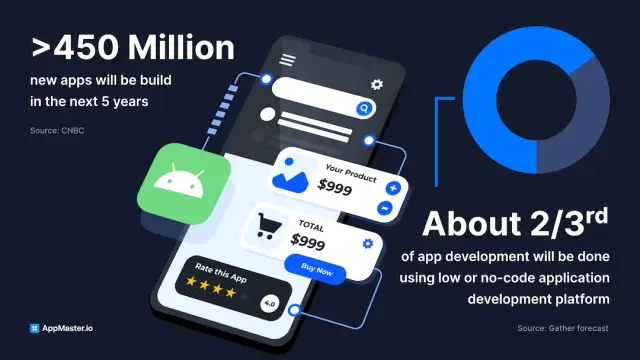How No-Code Solutions Are Revolutionizing HIPAA-Compliant App Development
Explore how no-code solutions are revolutionizing the development of HIPAA-compliant apps, offering safety, agility, and cost-efficiency in the healthcare industry.

The Significance of HIPAA and Healthcare App Development
The Health Insurance Portability and Accountability Act (HIPAA) plays a crucial role in the healthcare industry, establishing standards for protecting patients' medical records and personal health information. It's a federal law in the United States, enacted in 1996, significantly impacting healthcare app development.
As more healthcare organizations embrace digital solutions, the need for HIPAA-compliant applications has become increasingly important. Under the rules laid out by HIPAA, healthcare providers, payers, and other organizations handling patients' protected health information (PHI) must comply with strict privacy and security regulations. These rules apply to both traditional paper files and electronic records, as well as to the applications that manage and transmit this information.
Consequently, healthcare app developers must address these compliance requirements while creating innovative solutions that meet the demands of today's healthcare sector. Healthcare app development has become essential to providing modern, efficient, and patient-centric healthcare services.
From electronic health records (EHR) systems to mobile applications that help patients manage their health, these digital tools are transforming how healthcare professionals and patients interact. Ensuring that these applications adhere to the stringent requirements of HIPAA is a top priority for developers and healthcare organizations.
Challenges in Developing HIPAA-Compliant Healthcare Apps
Developing HIPAA-compliant healthcare applications is a complex undertaking involving a range of challenges that must be addressed to safeguard patients' sensitive health information while providing a seamless user experience. Some of the main challenges in developing compliant apps include:
- Understanding and adhering to regulatory requirements: With numerous data security and privacy requirements set forth by HIPAA, organizations must thoroughly comprehend these rules and ensure that their applications meet these standards from the outset of development.
- Implementing proper encryption and identity management: Healthcare apps must have powerful encryption and identity management features to securely protect the PHI they handle. Implementing these safeguards requires specialized knowledge and skills, which can be a barrier for some development teams.
- Keeping up with ever-changing regulations: Organizations must ensure their applications remain compliant as regulations evolve. This task entails regular updates and modifications, often demanding specialized expertise in both healthcare regulations and software development.
- High cost and complexity: Developing customized healthcare applications that align with HIPAA requirements can be expensive and time-consuming. These projects often require a team of experts, including developers, security specialists, and legal professionals, to drive up costs and stretch timelines.
These challenges can be daunting for healthcare organizations, particularly those with limited resources or in-house technical expertise. As a result, the need for simpler, more cost-effective solutions for developing HIPAA-compliant apps has become paramount.

No-Code Solutions: Changing the Game for HIPAA Compliance
No-code platforms have emerged as a game-changer in the development of HIPAA-compliant apps. These revolutionary tools empower users with little or no technical experience to create custom applications quickly and cost-effectively, all while ensuring compliance with HIPAA regulations.
No-code solutions offer visual development interfaces that allow users to design and build fully functional applications by dragging and dropping components onto a canvas. Behind the scenes, these platforms generate the necessary code to enable the apps to function as intended. The result is a highly agile development approach that reduces costs, mitigates non-compliance risk, and accelerates time-to-market. Many no-code platforms also come with pre-built security features, such as encryption and identity management, significantly reducing the complexity and cost associated with HIPAA compliance.
Furthermore, no-code platforms often include customizable templates and the ability to integrate with existing systems, enabling healthcare organizations to develop fully compliant applications without requiring specialized technical expertise.
By simplifying the development process and embedding compliance features directly within the platform, no-code solutions are democratizing access to HIPAA-compliant app development. This saves time and resources and fosters increased innovation throughout the healthcare sector. As organizations continue to embrace no-code platforms, the potential to transform the delivery of healthcare services is immense.
Key Benefits of Adopting No-Code Solutions for HIPAA-Compliant App Development
No-code solutions are rapidly becoming popular for developing HIPAA-compliant healthcare applications, and for good reason. No-code platforms significantly benefit healthcare organizations by simplifying the app development process, empowering them to create competitive and efficient apps that adhere to stringent regulations. Some of the key benefits of adopting no-code solutions for HIPAA-compliant app development include:
Reduced Development Time and Cost
One of the most significant advantages of no-code platforms is their ability to minimize development time and associated costs. Traditional app development processes often require substantial resources, including time, money, and skilled developers, to create and maintain HIPAA-compliant applications. On the other hand, no-code platforms greatly reduce these requirements by enabling non-technical users to develop fully compliant apps using visual interfaces and pre-built templates. This streamlines the development process, saving healthcare organizations both time and money.
Increased Agility and Flexibility
No-code solutions offer healthcare organizations greater flexibility and agility in app development. As regulatory requirements change or evolve, no-code platforms allow organizations to quickly adapt their applications, ensuring continuous compliance with HIPAA regulations. This flexibility is invaluable in an industry where adherence to strict guidelines is paramount and maintaining patient trust is essential.
Minimized Technical Debt
Technical debt is a burden that many traditional app development projects face, as outdated code and legacy systems often require ongoing maintenance and updates. No-code platforms like AppMaster help minimize technical debt by generating applications from scratch whenever requirements are modified. This eliminates the need to maintain and update outdated code, reducing long-term costs and allowing organizations to focus on innovation rather than maintenance.
Empowering Non-Technical Staff
No-code app development platforms give non-technical staff the power to create and manage their applications, democratizing app development within an organization. This enables healthcare professionals with domain expertise but limited technical knowledge to participate in the app creation process, leading to better, more targeted applications that address specific healthcare challenges with greater effectiveness.
Rapid Adaptation to Regulatory Changes
No-code platforms ensure healthcare organizations can quickly adapt their applications to comply with ever-changing regulations. By simplifying the development process and removing the need for extensive coding expertise, no-code solutions enable organizations to rapidly modify their applications in response to updates in regulatory requirements. This ensures continuous compliance with HIPAA and other relevant regulations, safeguarding sensitive patient data and maintaining patient trust.
AppMaster: Leading the Way in HIPAA-Compliant No-Code Solutions
AppMaster is at the forefront of providing no-code solutions for developing HIPAA-compliant healthcare applications. With an intuitive, powerful platform, AppMaster enables healthcare organizations to develop secure, efficient, and compliant applications without extensive coding expertise.

AppMaster stands at the forefront of HIPAA-compliant no-code solutions, particularly through its Enterprise subscription plan. With this plan, clients gain unprecedented access to the source code of their applications, providing the flexibility to host and manage these applications on their infrastructure. This feature is particularly advantageous for healthcare providers seeking to integrate their electronic health records (EHR) seamlessly.
The Enterprise subscription plan from AppMaster empowers clients with control over their applications and aligns with the stringent requirements of HIPAA and HITECH (Health Information Technology for Economic and Clinical Health) regulations. Access to the source code enables healthcare organizations to implement the solution in a cloud environment that adheres strictly to the security and privacy standards mandated by these regulatory frameworks.
AppMaster is designed with scalability in mind, making it an ideal solution for organizations of all sizes, from small startups to large enterprises. With a range of subscription plans available, including a free trial option, healthcare organizations can explore the benefits of no-code app development and choose the plan that best suits their needs.
Embracing the No-Code Revolution for a More Efficient Healthcare Sector
The rise of no-code solutions is revolutionizing the development of HIPAA-compliant healthcare applications. By simplifying the app development process, minimizing technical debt, and empowering non-technical staff, no-code platforms offer substantial benefits to healthcare organizations in an increasingly complex and regulated industry.
Choosing a powerful no-code solution, such as AppMaster, can significantly improve the efficiency and cost-effectiveness of healthcare app development, ensuring adherence to stringent regulations without compromising on innovation. By embracing the no-code revolution, healthcare organizations can position themselves for success in a rapidly evolving digital environment, delivering cutting-edge solutions that enhance patient care while maintaining compliance with HIPAA and other regulatory requirements.
Future Trends in No-Code for Healthcare
The sphere of healthcare app development is continually evolving, and no-code platforms are positioned to play a pivotal role in shaping its future trajectory. Here are some anticipated trends:
- Integration with Emerging Technologies: No-code platforms are likely to integrate seamlessly with emerging technologies such as artificial intelligence (AI), machine learning (ML), and the Internet of Things (IoT). This integration could empower healthcare professionals to develop advanced applications without delving into complex coding.
- Enhanced User Experience: Future iterations of no-code platforms should focus on refining user interfaces and experiences within healthcare applications. This emphasis on usability can lead to the creation of more intuitive and patient-friendly interfaces, ensuring that healthcare apps are accessible to a broader audience.
- Global Accessibility: As healthcare extends beyond regional boundaries, future no-code platforms may emphasize global accessibility. This could involve language localization, compliance with diverse healthcare regulations worldwide, and adapting to varied healthcare practices across different regions.
- Interoperability: No-code platforms are likely to increasingly prioritize interoperability, enabling seamless integration with existing healthcare systems and databases. This ensures that healthcare apps developed using no-code tools can communicate effectively with other components of the healthcare IT infrastructure.
- Telehealth and Remote Patient Monitoring: With the rise of telehealth and remote patient monitoring, no-code platforms may evolve to better support the development of applications catering to these trends. This includes features for virtual consultations, real-time data monitoring, and secure communication channels.
- Customization for Specialized Healthcare Needs: Future no-code platforms might offer more specialized modules tailored to various healthcare specialties. This would enable healthcare professionals to create custom applications addressing specific medical disciplines, ensuring a better fit for diverse healthcare workflows.
- Advanced Data Analytics: No-code platforms could integrate advanced data analytics capabilities, allowing healthcare professionals to derive meaningful insights from large datasets. This could be particularly valuable for evidence-based decision-making, personalized medicine, and population health management.
- Continuous Learning and Adaptation: Future no-code platforms may incorporate continuous learning and adaptation features to keep pace with evolving healthcare practices. This could involve regular updates, access to new modules, and integration with the latest advancements in healthcare technology.
- Security and Compliance Enhancements: Recognizing the critical importance of security in healthcare, future no-code platforms may implement enhanced security measures and compliance features. This includes encryption, secure data storage practices, and tools to facilitate adherence to healthcare regulations.
As these trends unfold, no-code platforms are poised to contribute significantly to the innovation and efficiency of healthcare app development, enabling healthcare professionals to focus more on patient care and less on the intricacies of coding.
FAQ
HIPAA stands for Health Insurance Portability and Accountability Act. It's a federal law in the United States that establishes standards to protect the privacy and security of patients' medical records and personal health information.
The main challenges in developing HIPAA-compliant healthcare apps include understanding and adhering to the numerous data security and privacy requirements, implementing proper encryption and identity management, keeping the app up to date with ever-changing regulations, and the overall cost and complexity involved in the development process.
No-code solutions are empowering non-technical users to develop fully compliant applications rapidly and cost-effectively. By offering visual development interfaces, pre-built security features, and seamless integration with existing systems, no-code platforms significantly simplify the development process and ensure adherence to HIPAA regulations.
The benefits of adopting no-code platforms include reduced development time and cost, increased agility and flexibility, minimized technical debt, empowering non-technical staff, and the ability to rapidly adapt to changing regulatory requirements.
AppMaster offers a powerful no-code platform with built-in security features, customizable templates, and the ability to integrate with existing systems, enabling healthcare organizations to rapidly develop and deploy compliant applications with minimal technical expertise.
Yes, modern no-code solutions are designed to handle the security requirements of sensitive healthcare data. Platforms like AppMaster.io offer pre-built security features, such as encryption and identity management, ensuring compliance with HIPAA regulations throughout the development process.





